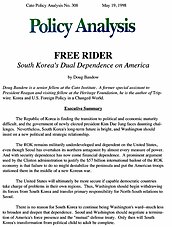The Republic of Korea is finding the transition to political and economic maturity difficult, and the government of newly elected president Kim Dae Jung faces daunting challenges. Nevertheless, South Korea’s long-term future is bright, and Washington should insist on a new political and strategic relationship.
The ROK remains militarily underdeveloped and dependent on the United States, even though Seoul has overtaken its northern antagonist by almost every measure of power. And with security dependence has now come financial dependence. A prominent argument used by the Clinton administration to justify the $57 billion international bailout of the ROK economy is that failure to do so might destabilize the peninsula and put the American troops stationed there in the middle of a new Korean war.
The United States will ultimately be more secure if capable democratic countries take charge of problems in their own regions. Thus, Washington should begin withdrawing its forces from South Korea and transfer primary responsibility for North-South relations to Seoul.
There is no reason for South Korea to continue being Washington’s ward–much less to broaden and deepen that dependence. Seoul and Washington should negotiate a termination of America’s force presence and the “mutual” defense treaty. Only then will South Korea’s transformation from political child to adult be complete.

This work is licensed under a Creative Commons Attribution-NonCommercial-ShareAlike 4.0 International License.

